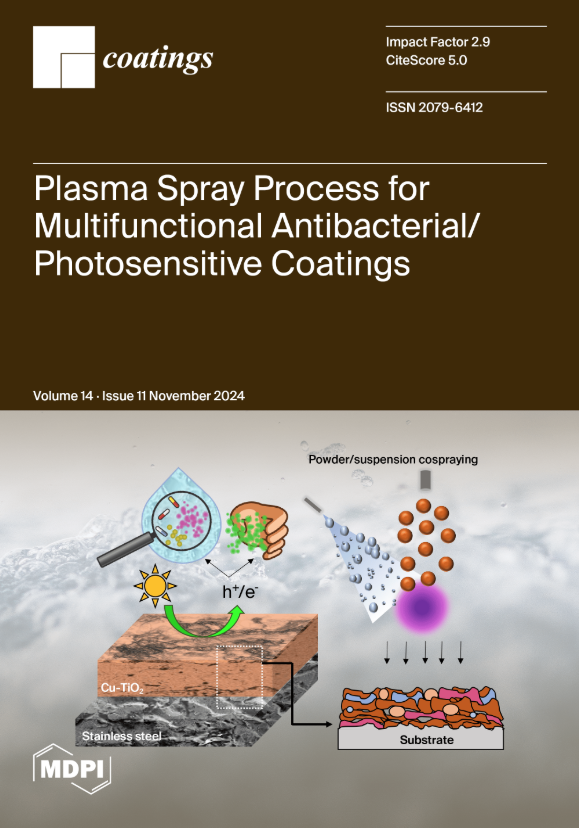Sol-Gel SiO2 Coatings with Curcumin and Thymol on 3D Printouts Manufactured from Ti6Al4V ELI
IF 2.8
3区 材料科学
Q2 MATERIALS SCIENCE, COATINGS & FILMS
引用次数: 0
Abstract
Bacterial biofilm on implants may cause inflammation, which disturbs the process of the implant’s integration with the surrounding tissues. Such problems are becoming critical for patients’ health, especially in connection with the presence of antibiotic-resistant bacterial strains. Among the existing alternatives for drug treatments are natural-based substances. This study focused on the examination of silica coatings with curcumin and thymol, which were deposited using the sol-gel method on 3D printouts made of Ti6Al4V ELI. This substrate material is commonly used in medicine. The selective laser melting technique used for the manufacturing of samples was in line with the existing procedures applied for individual orthopedic implants. The examination involved the assessment of the coatings’ morphology, chemical composition, and biological effect. The antibacterial properties were tested using a flow cytometer using Escherichia coli, and the cytotoxicity on Saos-2 cells was assessed using the LIVE/DEAD test. The obtained results showed that it is possible to produce silica sol-gel coatings with the addition of specific natural substances in concentrations assuring a bacteriostatic effect. The produced coatings did not show any cytotoxic effect, which confirms the possibility of using both curcumin and thymol as additives to coatings used in medicine, e.g., for orthopedic implants.在由 Ti6Al4V ELI 制成的 3D 打印件上使用含有姜黄素和百里酚的 Sol-Gel SiO2 涂层
植入物上的细菌生物膜可能会引起炎症,从而干扰植入物与周围组织的整合过程。这些问题对患者的健康越来越重要,尤其是在出现抗生素耐药菌株的情况下。在现有的药物治疗替代品中,有一种是天然物质。这项研究的重点是对含有姜黄素和百里酚的二氧化硅涂层进行检测,该涂层是在由Ti6Al4V ELI制成的三维打印件上使用溶胶-凝胶法沉积而成的。这种基底材料常用于医学领域。用于制造样品的选择性激光熔化技术与现有的用于个别骨科植入物的程序一致。检查包括对涂层的形态、化学成分和生物效应进行评估。使用流式细胞仪检测了大肠杆菌的抗菌特性,并使用活/死试验评估了 Saos-2 细胞的细胞毒性。结果表明,在生产二氧化硅溶胶-凝胶涂层时,添加特定浓度的天然物质可确保抑菌效果。生产出的涂层没有显示出任何细胞毒性效应,这证实了将姜黄素和百里酚作为添加剂用于骨科植入物等医学涂层的可能性。
本文章由计算机程序翻译,如有差异,请以英文原文为准。
求助全文
约1分钟内获得全文
求助全文
来源期刊

Coatings
Materials Science-Surfaces, Coatings and Films
CiteScore
5.00
自引率
11.80%
发文量
1657
审稿时长
1.4 months
期刊介绍:
Coatings is an international, peer-reviewed open access journal of coatings and surface engineering. It publishes reviews, research articles, communications and technical notes. Our aim is to encourage scientists to publish their experimental and theoretical results in as much detail as possible. There is no restriction on the length of the papers. Full experimental and/or methodical details must be provided. There are, in addition, unique features of this journal:
* manuscripts regarding research proposals and research ideas will be particularly welcomed
* electronic files or software regarding the full details of the calculation and experimental procedure - if unable to be published in a normal way - can be deposited as supplementary material
 求助内容:
求助内容: 应助结果提醒方式:
应助结果提醒方式:


